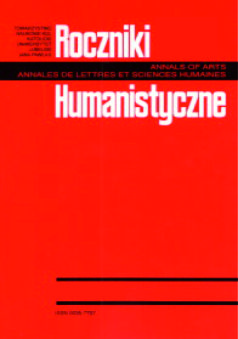ROLA POLSKIEJ LITERATURY FAKTU (I NIE TYLKO) W OBALANIU TABU HISTORYCZNYCH. PRÓBA OMÓWIENIA PROBLEMATYKI
NA LITERACKICH PRZYKŁADACH HOLOKAUSTU
I JEDWABNEGO
THE ROLE OF POLISH NON-FICTION (AND MORE) IN DISMANTLING HISTORICAL TABOOS:
AN ATTEMPT TO DISCUSS THE ISSUE BASED ON LITERARY WORKS
ON THE HOLOCAUST AND JEDWABNE
Author(s): Orsolya NémethSubject(s): Polish Literature, History of the Holocaust, Sociology of Literature
Published by: Towarzystwo Naukowe KUL & Katolicki Uniwersytet Lubelski Jana Pawła II
Keywords: taboo; Holocaust; Jedwabne; system transformation; language of narration;
Summary/Abstract: After the political transformation in 1989, an extremely intensive process of “coming to terms” with the past was beginning in Poland and the former Eastern Bloc. Under the communist regime, many topics became taboo, not to be raised. The transformation brought a kind of thematic libera- tion, and literature became one of the most important means of confronting and processing the past. In this article, I attempt to demonstrate this role of literature through the examples of works dealing with the Holocaust and Jedwabne: Anna Bikont’s We of Jedwabne, Tadeusz Słobodzianek’s Nasza klasa (“Our class”), Lidia Ostałowska’s Watercolours: A Story from Auschwitz, and a story written by the Hungarian writer Zoltán Halasi (Út az üres éghez — “The Road to an Empty Sky”). In such a context, it is also important to develop a general picture of the tabooing process, the role and working of collective and individual memory. The second fundamental issue is the language, style and form of the text, since it should be asked how the ineffable can be narrated.
Journal: Roczniki Humanistyczne
- Issue Year: 72/2024
- Issue No: 1
- Page Range: 107-122
- Page Count: 16
- Language: Polish

